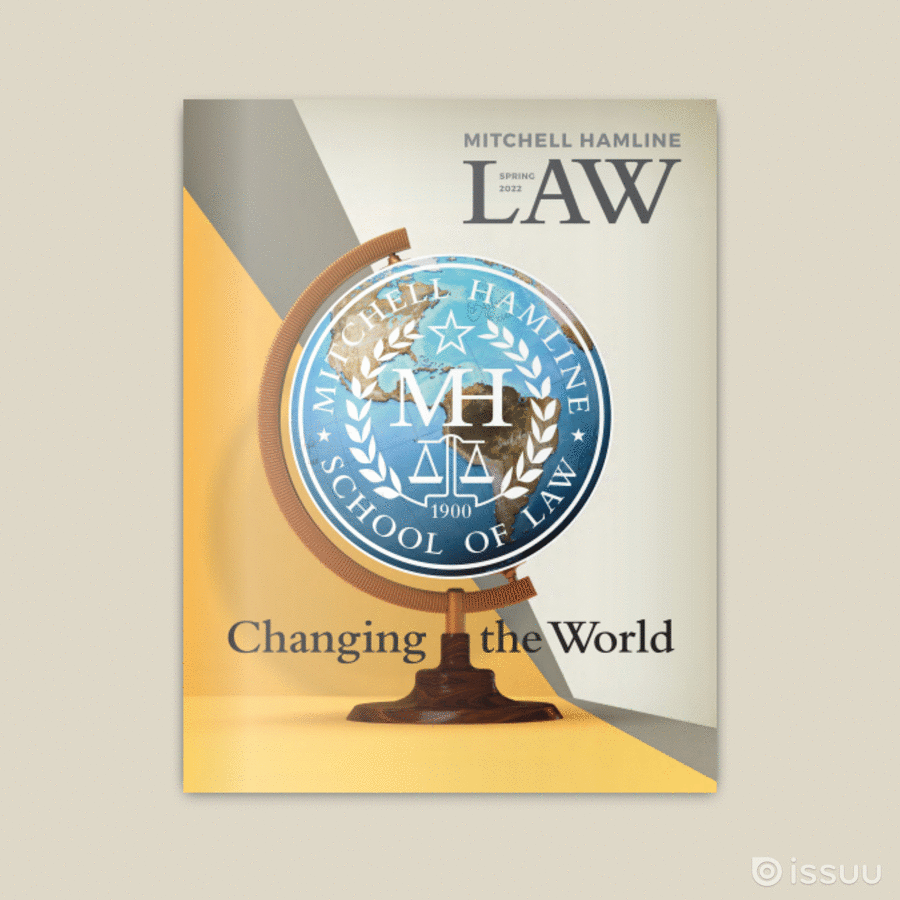Blanke, Butterfoss, Failinger, and Winer retire from Mitchell Hamline
Four important leaders in the history of Mitchell Hamline and its predecessor schools retired in the past year. In addition to their important scholarship and teaching abilities, Doug Blanke, Ed Butterfoss, Marie Failinger, and Anthony Winer also held crucial leadership roles. Blanke founded the Public Health Law Center at Mitchell Hamline; Butterfoss and Failinger both served as deans at Hamline Law (they also started at the law school on the same day in 1983); and Winer was a trailblazer for LGBTQ+ people in legal education.
 Doug Blanke, longtime head of Public Health Law Center
Doug Blanke, longtime head of Public Health Law Center
After 22 years at the helm of the Public Health Law Center, Executive Director Doug Blanke retired at the end of June 2022. Doug’s achievements in public health policy, legislative advocacy, and consumer protection, span four decades on the local, state, national, and international stages.
-
Continue Blanke retirement story
A former Minnesota Assistant Attorney General, Doug played a key role in the historic ligation against the tobacco industry in the 1990s, resulting in the seminal release of internal documents that exposed the tobacco industry’s long history of deceptive marketing, advertising, and research. In 2000, Doug founded what is now the Public Health Law Center at Mitchell Hamline School of Law. From a one-person law and policy think tank on commercial tobacco control issues, the Center grew under Doug’s leadership to become a national organization of over 30 public health attorneys, policy analysts, and support staff that help community leaders strengthen public health laws and health equity.
Today, the Public Health Law Center is the nation’s leading source of legal technical assistance on commercial tobacco control, and assists Tribal, federal, state, and local health advocates and policymakers in dozens of health policy areas, ranging from supporting healthy food access, to the expansion of active transportation policies, to the incorporation of environmental justice in health policy. The Center’s work to eliminate menthol in commercial tobacco products, in partnership with Black-led organizations over the past decade, played a part in the U.S. Food and Drug Administration (FDA) decision in April 2021 to eliminate menthol in cigarettes, and exemplifies the Center’s impact on national policy.
“The national fight to get mentholated tobacco products off the U.S. market owes a huge debt of gratitude to Doug Blanke and the Public Health Law Center. It was the Center that convened national strategy sessions, ‘listening and valuing’ all of the voices at the table. Before ‘equity’ became a buzzword, they sought us out to partner, support, and champion this cause,” said Carol McGruder, Co-Chair of the African American Tobacco Control Leadership Council. “We thank Doug Blanke and the Center for their unwavering partnership with us to Save Black Lives!”
To read an article from our Spring 2022 issue of Mitchell Hamline Law magazine about PHLC’s efforts to ban menthol, click here.
“From fighting Big Tobacco to tackling racism as public health crisis, Doug’s legacy is in the evolution of public health law, in embedding racial and health equity into how and why we advocate for healthy communities,” said Vayong Moua, Director, Health Equity Advocacy, Blue Cross Blue Shield of Minnesota Center for Prevention.
“Doug has made extraordinary contributions to public health and tobacco control over a long and illustrious career,” said Mitch Zeller, Director of the FDA Center for Tobacco Products. “What has so impressed me over the decades I have known Doug is his strong commitment to using the tools of the law to advance public health and social justice. He will be missed.”
Doug’s visionary leadership in public health policy extended to the international stage when he helped draft the global guidelines for smoking regulation, adopted as part of the world’s first public health treaty, the World Health Organization’s Framework Convention on Tobacco Control. He also edited the World Health Organization’s handbook on tobacco control legislation.
“Doug made giant contributions towards the elimination of the death and disease caused by tobacco that will continue to ripple around the U.S. and the world,” said Tim McAfee, former director of the Centers for Disease Control and Prevention’s Office on Smoking and Health. “What I loved about working with Doug was that he brought a solid sense of good will to inter-organizational work, communicating a sense that we were all in this together.”
In 2004, the American Lung Association presented him with its C. Everett Koop “Unsung Hero” Award for his contributions to tobacco control. He is currently Chair of the Board of Trustees for Action on Smoking and Health (ASH), having served on its board since 2007.
“Doug Blanke has done more than anyone to advance tobacco control from behind the scenes. Countless policies around the country and around the world are more effective and more legally defensible because of his wise counsel,” said Micah Berman, Associate Professor of Public Health and Law at The Ohio State University. “For me and many others in public health, he has been a role model, a mentor, a friend, and a beacon of moral clarity.”
A national search is currently being conducted to select the next Executive Director at the Public Health Law Center.
This article first appeared on the Public Health Law Center’s website.
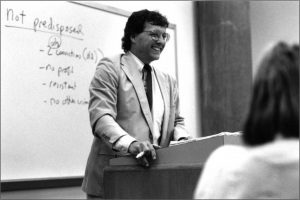 Ed Butterfoss, longtime professor and former Hamline Law dean
Ed Butterfoss, longtime professor and former Hamline Law dean
Ed Butterfoss always returned to teaching.
During his time as a faculty member at Hamline University – and later Mitchell Hamline – schools of law, Butterfoss found himself elevated – sometimes drafted – for leadership positions, including several years as Hamline Law’s dean. But he always felt the pull of the classroom, eschewing a long career in administration to return to his faculty positions.
-
Continue Butterfoss retirement story
A well-known instructor of contracts, criminal law, and criminal procedure – which included several appearances in local media to comment on various news stories of the day – Butterfoss retired this month after nearly 40 years in legal education.
“Ed has given so much to the legal community in Minnesota and beyond,” said President and Dean Anthony Niedwiecki. “In addition to the many thousands of students he’s taught, Ed always stepped up to leadership positions when asked, and his ability to work with anyone made him successful each time.
“He helped Hamline Law grow, which in turn helped Mitchell Hamline be the law school it is today.”
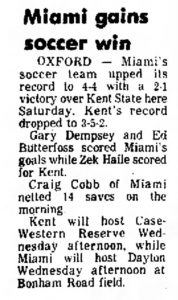
Butterfoss’ soccer prowess, as detailed in an article from the Hamilton (OH) Journal News on Oct. 24, 1976.
Raised in New Jersey, Butterfoss earned an undergraduate accounting degree – and played on his university’s soccer team – before gravitating to law school. After graduating from Georgetown Law, he was in private practice for three years in Philadelphia before joining the faculty at Hamline Law in 1983 as an assistant professor.
“At that point, our school was barely 11 years old and not well known, so it was a leap of faith to come to Hamline,” said Professor Marie Failinger, who began at the law school the same day as Butterfoss. “As I remember it, it was sort of culture shock for him to come from the East Coast to Minnesota, which was overwhelmingly white. So, one of his first and longest-term efforts was to try to bring more racial diversity to Hamline.”
“I went to any event and talked to anyone I could,” said Butterfoss. “People were incredibly welcoming and eager to help. I think we did a lot of good work over the years, especially to diversify the student body.”
Much of Butterfoss’ efforts were in partnership with the Minnesota Minority Lawyers Association, which awarded the school and Butterfoss its Distinguished Service Award in 1989. “To me, that’s the most important work I’ve done,” he added.
Butterfoss was also a founding board member of the Innocence Project of Minnesota, a board member of the ACLU of Minnesota and Centro Legal of Minnesota, and a member of the ABA Accreditation Committee, which he chaired for three years.
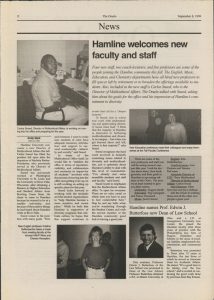
Page from The Oracle, Hamline University’s student newspaper, from September 1998, including an article announcing Butterfoss’ appointment as dean.
In the 1990s, Butterfoss was tapped for a leadership role, serving as associate dean for academic affairs from 1995 to 1998, before being named dean of Hamline Law. He served for five years. During his tenure, Hamline Law began a program that allowed students to attend on weekends – an idea born from a conversation with a student, according to Butterfoss. At the time, it was only the second such program in the nation. Hamline Law also gained a national reputation for its alternative dispute resolution program during Butterfoss’ deanship.
But it was his personable leadership style that most of his colleagues from that time recall. “Hamline Law School had no finer dean than Ed,” said Professor Emerita Carol Swanson, who served as associate dean during his deanship. “I knew Ed to be a rare unicorn among law faculty and particularly deans, possessing endless humility and common sense. A peerless problem-solver, Ed most often cut to the chase with surgical precision.”
“When Professor Butterfoss became Dean Butterfoss I learned what true leadership is,” added Professor Emeritus Joe Daly.
“Ed was a thoughtful leader who treated everyone fairly when he served as our dean at Hamline,” said Professor David Larson, who began at Hamline the year Butterfoss became dean. “It’s no surprise that he always has been an effective and popular professor because, to put it simply, he is a genuinely good person.”
Butterfoss stepped down as dean after the 2002-2003 school year to return to teaching after what had been eight years in administrative positions. A group of alumni, faculty, and staff stablished a diversity scholarship in his name that’s still awarded annually to an incoming student.
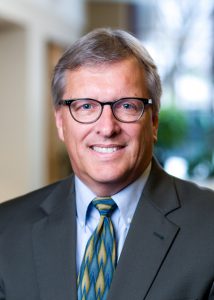
Professor Ed Butterfoss
But the calls to return to leadership never fully stopped.
When Lucinda Jesson, then the director of Hamline’s Health Law Institute, was named chair of the law school’s dean search committee in the late 2000s, the responses she heard most from faculty, staff, students, and alums were “Will Ed Butterfoss become dean again?” and “Hire someone like Ed.”
“During my five years at Hamline, I never met a student, staff member, faculty, or alum who did not have good things to say about Ed Butterfoss,” said Jesson, who is now a judge on the Minnesota Court of Appeals. “He arrived on campus with boundless optimism and energy every day, and that optimism shone through in every interaction with him.”
While Butterfoss did serve one later stint as associate dean – from 2010 to 2012 – he always considered himself a teacher first. He was known for often riding his bike to work and hosting Kentucky Derby parties. And Butterfoss coached more than 50 teams in local recreation leagues – once commenting there were few children in St. Paul’s Macalester-Groveland neighborhood he hadn’t coached in some sport.
“Ed Butterfoss was one of my favorite professors in law school because of his sincere enthusiasm for the law, and his way of making everyone in his class feel included and worthy of being a future lawyer,” said John Choi, a 1995 Hamline Law alum who is now Ramsey County Attorney and a Mitchell Hamline trustee.
“Above all, his service to the broader community and commitment to improving the quality of justice in our state is a legacy that all of us should seek to emulate in our professions.”
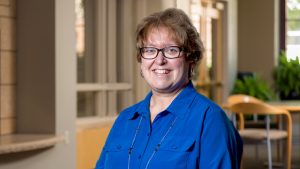
Longtime professor, former Hamline Law dean Marie Failinger
Marie Failinger, a longtime professor who was Hamline University School of Law’s final dean in the months before the 2015 combination with William Mitchell College of Law, retired in January 2023 after nearly 40 years.
Failinger, 70, said she still plans to be involved with Mitchell Hamline, but she’ll no longer teach full time because of her health.
-
Continue Failinger retirement story
“I’m in pretty good shape now, but I wasn’t sure I could continue being a professor at the level I expect of myself,” said Failinger. “My future is uncertain, but this is also a good time to let the next generation of leaders take on several new initiatives at the school.”
During her time at Hamline Law and Mitchell Hamline, Failinger taught a range of subjects, from constitutional to criminal to family and property Law. She has also been a leading voice on women in the legal profession, having helped found the Infinity Project – an organization dedicated to getting more women on the bench at the state and federal level within the 8th Judicial Circuit – and being an active member of Minnesota Women Lawyers.
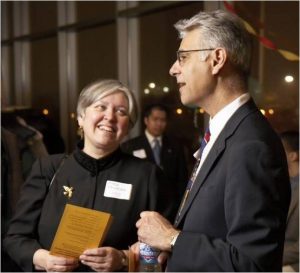
Professor Marie Failinger (left) and Jose Roberto (Beto) Juarez, chair of the Journal of Law and Religion editorial board, during Juris Fiesta in 2008.
“Marie is one in a million,” said Professor Morgan Holcomb, who served as associate dean at Hamline Law when Failinger was interim dean and the school was transitioning to the combination with Mitchell. “She’s the kind of faculty member I strive to be – a scholar whose passion about her subject area comes through in every article and a teacher who respects each student’s intellect as well as their humanity.”
A lot of Failinger’s scholarship focused on the intersection of the law and religion. She served as editor in chief of the Journal of Law and Religion for nearly a quarter century, until 2013. “I was drawn to it because it was a way to think intellectually about my own Lutheran faith tradition,” she noted.
“With her talents for working with all stripes of professors, students, staff, and the public, she quietly undergirded the law and religion conversation in the United States and beyond for decades,” wrote Emily Albrink Hartigan, a retired professor at St. Mary’s University School of Law, in a tribute in the journal last March.
Failinger also has been a steadfast de facto historian for Mitchell Hamline and its predecessor schools, gathering oral histories from several former faculty members and alums and heading a history committee at the school. She also created an oral history project for the AALS Section on Women in Legal Education.
“Marie is a consummate professional,” added Professor Kate Kruse, who also served as an associate dean at Hamline Law just before the combination. “She is always thinking about ways we could be doing things better and who might be excluded by our policies and practices.”
Raised in the Midwest, Failinger attended college and law school in Indiana and initially worked for a legal services organization there before getting a master’s degree at Yale and switching to legal education. She was recruited to Hamline University School of Law in 1983 and was drawn to the idea of helping grow a nascent school that had only been founded a few years prior.
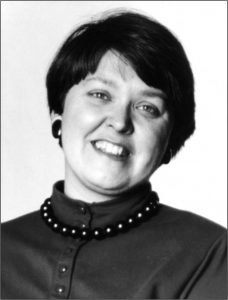
File photo of Professor Marie Failinger when she was at Hamline University School of Law.
“I came to Hamline hoping to educate students more clearly about the challenges that my clients, who were the indigent folks that we served at Legal Services, had getting justice in the courts,” she said. “What I hope I accomplished throughout these years was to get students to open their eyes to the way law both reinforces injustice and serves as a vehicle for justice,” said Failinger. “Especially for the most vulnerable in our society.”
Failinger had two stints as associate dean at Hamline Law before the school needed an interim leader to shepherd the school through its combination with William Mitchell in 2015. Those nine months were spent in intense negotiations with the American Bar Association, which needed to give its acquiescence for the combination. Once the school had moved to the current Mitchell Hamline campus, Failinger recalls vividly being the last one to leave and turning out the lights at Hamline.
“Marie was an incredible source of historical knowledge, insight, and wisdom during that time,” said Professor Mark Gordon, who became president and dean of William Mitchell just before the combination. “She was innovative in her thinking, tireless in her efforts, and candid in her advice.
“I think Marie played an extremely significant role in the success of the combination.”
Failinger was also a mentor for students like Lori Saroya ’13, who recently took office as the first woman of color and Muslim member of the Blaine, Minn., city council. “She was instrumental in helping me navigate law school and realize my potential, even when I ran for city council,” said Saroya.
“It’s amazing to have a professor who believes in you and continues to encourage and support you a decade after you leave their classroom.”
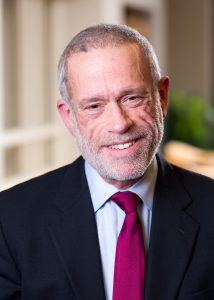 Anthony Winer, trailblazer for LGBTQ+ people in legal education
Anthony Winer, trailblazer for LGBTQ+ people in legal education
Anthony Winer spent the 1980s working at the Federal Reserve Board in Washington, then two big firms in New York City. By all accounts, he could have stayed in New York and had a lucrative career in international banking law.
But Anthony Winer also spent the latter part of the 1980s watching many of his friends and acquaintances die from AIDS. The distress was compounded by the death of Winer’s own partner of 12 years, in 1989.
-
Continue Winer retirement story
“Much of the trauma and death surrounding the AIDS epidemic was built on fear and ignorance about gay people and same-sex sexual attraction,” said Winer. “I finally realized that I could make a positive contribution by leaving the law as I had been practicing it and serving academically as an out gay law professor.
“I hoped I could present a positive example for lesbian and gay students and also break other people’s stereotypes of lesbian and gay people.”
As Winer retires after more than 30 years teaching at Mitchell Hamline, he does so as a trailblazer for LGBTQ+ people in legal education – the first full-time tenure-track and openly gay doctrinal law professor in Minnesota who regularly taught courses in, and wrote academically concerning, issues specifically concerning lesbian and gay people.
“I am so grateful for Tony’s tireless advocacy at a time when it was still risky to be out in our society,” said Mitchell Hamline President and Dean Anthony Niedwiecki, one of a handful of openly LGBTQ+ law school deans in the country. “You can draw a line from his work to my being where I am as an out gay man, but Tony should also be remembered as a phenomenal teacher who helped all of his students gain a better understanding of the law.”
Getting Started
When Winer realized it was time for a career change, he enrolled in an LL.M. program at NYU School of Law specifically designed for students who wanted to become law professors. At a job fair near the end of that program, he told faculty recruiters from law schools across the country he was a gay man who wanted to focus on teaching banking law and the laws around sexual orientation. He recalls getting about ten interviews but only one call back – from William Mitchell College of Law in Minnesota.
He began in the fall of 1991 and his course on sexual orientation and the law soon became wildly popular. He has taught the course ever since. “It was a groundbreaking seminar,” said professor emerita Ann Juergens. “One of the first of its kind and his teaching was always impeccably prepared and rigorous.”
“I went to law school when there was more focus on faculty getting published than actually being a good teacher,” added Winer. “I made it my mission to not be like that. I planned out and structured Socratic questions in a way that proceeded in a logical way, so that students who had done the reading would have an improved understanding.”
Recruiters
In 1991, the Association of American Law Schools (AALS) required its member schools to enact policies that banned discrimination based on sexual orientation. It also required employers that visited campuses to recruit employees also have such nondiscrimination policies in place.
That led to many law schools banning military recruiters because of the “don’t ask, don’t tell” policy at the time that banned openly gay and lesbian people from service. Congress then amended the law to put pressure on schools by threatening federal grants if they denied military recruiters.
Because William Mitchell wasn’t connected to a larger university that relied on such grants for things like research, the school was one of a handful to keep its ban in place – until the feds threatened to take away federal loans for students.
When Mitchell relented, Winer organized faculty and students to picket the front of campus on days the military recruiters would be present. He believes Mitchell was the only law school in the country to picket the presence of military recruiters at that time.
“We were confident we were on the right side of history, but we also knew there could be alums who would’ve disagreed with what we were doing,” said Winer. “Some people saw us as being anti-military, but we weren’t anti-military at all. Just anti-discrimination, and we tried to make that clear.”
The issue came to a head in the local press. “One person who was critical of us, who was also an alum, published a commentary in the [Minneapolis] Star Tribune, saying how disappointed he was in how we were treating the military.”

Winer, Juergens, and 36 colleagues at William Mitchell authored and signed onto this commentary in the Minneapolis Star Tribune on Apr. 29, 2000, defending the school’s picketing of military recruiters on campus.
In response, Winer and Juergens penned a response joined by 36 colleagues. “It was remarkable. Even more conservative faculty members and staff signed on.”
When the military’s “don’t ask, don’t tell” policy ended in 2011, Kent Greenfield – a Boston College law professor who was part of an unsuccessful court challenge by law schools in the 2000s – told the Associated Press that William Mitchell was “worthy of a lot of admiration and thanks from gay and lesbian service members and gay and lesbians around the country for sticking up for gay rights.”
Project 515
Winer also played a “critical” role in securing marriage equality in Minnesota, according to Lee Anderson ’97, vice president for government and public affairs at General Mills. Anderson was a co-founder of Project 515, which was borne of a project Winer oversaw to document every place in Minnesota’s laws that discriminated against same-sex couples because they only granted rights to opposite-sex married couples.
The volunteers, who included several William Mitchell alums, “met regularly with Professor Winer to review statutes that were more difficult to interpret,” added Anderson. The result was a list of 515 laws. “For the first time ever, discrimination under the law against same-sex couples in Minnesota had been defined and Project 515 was born.”
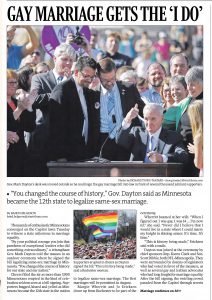
Front page of the Minneapolis Star Tribune on May 15, 2013, after Gov. Mark Dayton signed marriage equality into law.
The organization became one of two to create the campaign that defeated a proposed constitutional amendment in 2012 that would have banned same-sex marriage. The campaign then advocated for the Legislature to enact marriage equality, which it did in 2013. “It all started with that original research overseen by Professor Winer’s keen legal eye,” said Anderson.
Legacy
In addition to his important work on LGBTQ+ issues, Winer never strayed from his first expertise in business and international law. He coached the International Moot Court team and advocated for international law to be better integrated into Mitchell Hamline’s curriculum, according to Juergens. His work also led to a Fulbright Scholarship that included him making several trips to Azerbaijan, including during the 2008-9 academic year to teach international law.
He also taught professors in the former Soviet republic about teaching methods used in Western law schools. Much of his work was through what is now called the American Bar Association’s Rule of Law Initiative.
For all his advocacy, Juergens also notes Winer “was firmly in the camp of not letting students know the teacher’s own views on political or justice issues. He sought to remain a blank slate and probe the students, so their own views became clear to them.
“In doing that, his students also learned what a supportive teacher he was. He always made time for them.”

